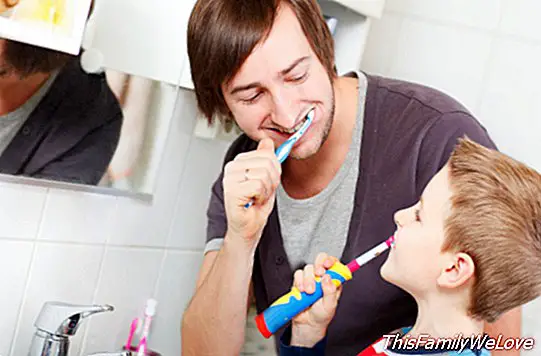Half of Spanish children, suspended in brushing teeth
Any parent will sound that "daily battle" to get their children sbrush your teethand do it well. The truth is that difficulties are common for children to acquire a proper oral hygiene, and many times it is not achieved. This is revealed by a study conducted by Colgate, who has found that almost half of Spanish children do not know how to brush their teeth.
The study has been carried out with the intention of knowing "the state of oral health of children and supporting parents to encourage daily brushing routine", according to Colgate, who explains that a total of 1,000 parents participated in the study. Among the most striking results highlights that almost one third of the children of our country brush only the front teeth and omit the back, "which leads them to suffer serious dental problems during breastfeeding," warns the toothpaste company.
Brushing time
About how long the brushing lasts, this company assures that it is an issue that varies throughout Europe, although it warns that in our country almost half (43.1%) of children "do not brush their teeth the necessary time ", a figure that is comparable to that of Belgium, where the percentage stands at 43%. At this point, Colgate remembers that The recommended time for brushing is two minutes.
In order to help parents and give advice and advice "in their struggle to get their children to sign up to the routine of having a healthy mouth", Colgate has launched a campaign called 'Colgate's 2015 Oral Health Mission'.
"This initiative has been launched in collaboration with professionals in dentistry and psychology, to ensure that all the tools made available to parents are adapted to help all families in Europe," says the company, who appeals again to the value of the example of the parents in this aspect.
The example of the parents

We've talked a lot about how important it is for parents to be a good example for children, and this is another of the many cases in which it is essential that the parents show their children that they do what they ask the children to do. In this regard, Colgate comments that, although each family is different and has its own methods to "promote healthy smiles ", the vast majority of parents (94.2%) recognize that the habit of children in relation to tooth brushing "is directly related to the example they receive from their parents. "
Likewise, also 94.2 percent of parents "recognizeThe importance of brushing teeth regularly in front of their children to give them a good example, "an important percentage that comes to tell us that parents are very aware of the teaching of oral hygiene to their children.
"People learn from each other by observation," says Mariana Segura, psychologist at this point. "Hygiene habits are very susceptible to this type of learning and, in the first years of life, parents are basic models in behaviors such as brushing teeth, "he continues, while ensuring that the period between two and six years" is crucial to establish the habit of tooth brushing. "
How to get my son to brush his teeth
The survey also reveals that Spanish parents, like their European colleagues, "use creative methods to get their children to take care of the health of their mouths." Among these formulas Colgate has highlighted the following as more common and popular:
-Convert brushing on a game
-Put a timer to control the brushing time
-Reward to your children if they brush their teeth
-Put the favorite music of your children during brushing
In this regard, this psychologist indicates that both reinforcement and compliments and paying attention to the child while brushing his teeth are "of the best ways to monitor correct behavior and educate in positive"This expert recommends using the so-called 'points table', because it serves as a tool to improve the behavior of the child." The behaviors that are going to be positively reinforced when they are assigned a point or smiley face are selected. When the behaviors are reinforced, it increases the probability that they reappear, "insists Segura.
Visits to the dentist
If you want some healthy teeth, it is necessary to visit dentist at least once a year, another aspect in which the Spaniards suspend: the survey reveals that Spaniards visit the dentist less frequently than their French neighbors. Specifically, in France, 45.6 percent of children go to the dentist once a year, a percentage that is 40.4 percent in our country.
With respect to oral interventions, the figures show that in Spain at seven years 16.2 percent of children already have some filling and that 12% have suffered some extraction. In this regard, 27% of parents surveyed believe that this high percentage is due to the fact that children do not brush their teeth well and that they take too many sugary foods.
In conclusion, this company invites parents to set an example, take children to the dentist and not abuse sugars. In summary, "Keeping our mouths healthy is possible if we make small gestures every day"they conclude.
Angela R. Bonachera




